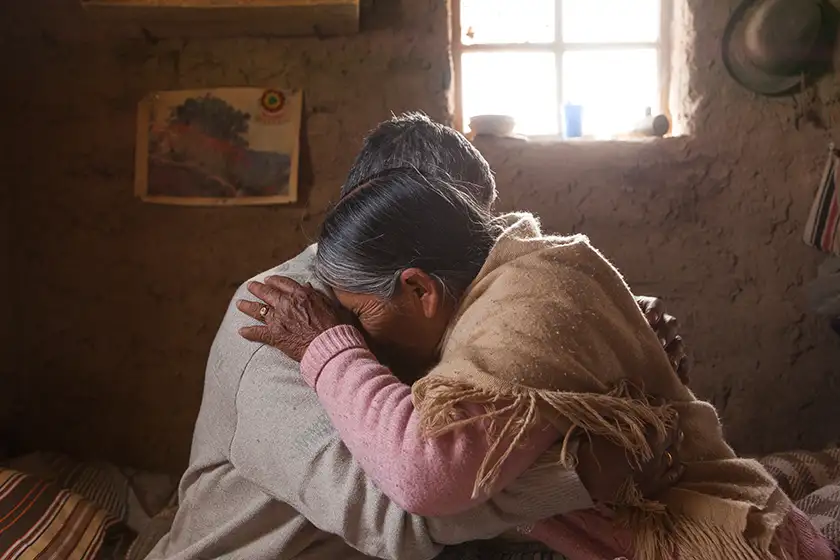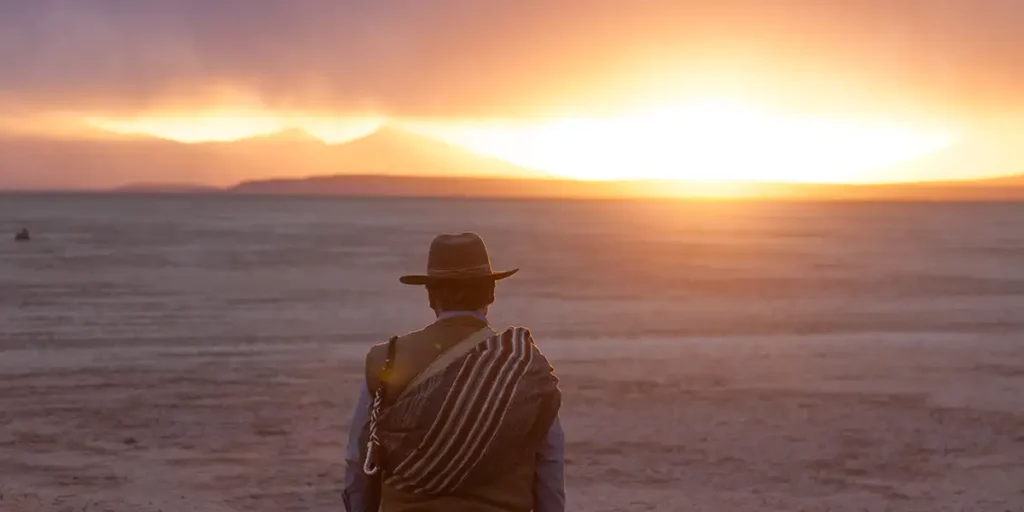Utama, Alejandro Loayza Grisi’s astonishing debut, delivers a fresh new perspective on the climate crisis, telling a small story about a big subject matter.
A simple story, well told, can sometimes be the most effective way to make a necessary point. In Alejandro Loayza Grisi’s lean but powerful Utama – which translates to Our Home in Quecha – the power of its message around the devastation of climate change on the world comes from showing that damage in relation to how it affects those who don’t often get their stories told. There is more power and urgency in Utama’s delivery than in something obtusely in your face like Adam McKay’s apocalyptic satire Don’t Look Up, a film that tackles similar messaging about the climate crisis.
In the vast, arid desert of Bolivia, an elderly Quechua couple maintain their peaceful existence. Their lives are simple. Their daily routine of fetching water and spinning llama wool together in silence is undisturbed as they live off the land they reside on. But this world is slowly becoming unwelcoming to their customs and their peaceful way of life. Their village is gradually being abandoned by its residents who are seeking a life that doesn’t require walking miles for water. Virginio (José Calcina) stubbornly continues in the prolonged hope that the rain will come, regardless of his wife Sisa’s (Luisa Quispe) protests about the parched land. Climate change has hit the Bolivian Highlands in director Alejandro Loayza Grisi’s debut feature, which wonderfully combines the tranquility of a fulfilled life with the charged rumination of that life being destroyed by the actions of the West. What follows is a methodical meditation on the importance of maintaining a healthy connection to the land they, and laterally we, rely on, while juxtaposing generational ideology on climate and culture.
The generational element of Utama is introduced with the arrival of the couple’s grandson Clever (Santos Choque), who appears not with a message from his father as the crotchety Virginio declares in native Quechua, but to persuade the two that his way of life, along with rejoining the family that departed for a life cultivated by western ideals, is the best place for them. His arrival, with headphones wrapped around his neck, wearing unsoiled jeans and branded jacket reference the modern society that the couple shy away from.
One such moment of light sneer from Clever highlights the disparity between their lives, as Virginio shares bread with his unappreciative grandson as they graze the llamas. It’s quite a fascinating dynamic between the disparate generations, contributing heavily to what Grisi is saying about embracing modernity and respecting the land on which it thrives. This is also apparent in how Grisi translates – literally – the cultural and generational divide in Clever’s inability to speak his native Quechuan tongue, as if Clever has disconnected himself from his roots.

Grisi, who began his career as a photographer and then proceeded into cinematography, deftly captures the stark beauty of this Bolivian outback. His intimate direction here captures what the land means to Virginia and Sisa, from a close-up of the dry cracked desert skin to the panoramic Bolivian vistas that they don’t want to leave. What Grisi accomplishes is nothing short of spellbinding, the attachment that he has to his homeland appearing through the lens of his camera. This passion bleeds into every inch of the frame and is helped in part by Grisi’s decision to cast native residents in his movie.
Grisi found José and Luisa on a scouting trip, which he refused to take part in until months later, and after a fruitless traditional casting process. The two, a real-life Quechuan couple in the throes of their world being taken away from them, have wonderful natural chemistry together. So much so that Grisi comments: “In real life they are a couple, and they are even more tender than in the movie. In fact, for the movie, I had to add some mischief to them and that was what they had the hardest time doing, “getting mad” at each other or yelling at each other.” Choque, however, is a professional actor. He has sweet chemistry with the two natives, which was no doubt helped by Choque’s decision to spend full days accompanying the two in their daily activities in order to deepen his relationship with the two.
Utama is a quietly devastating, passionate plea for our earth. It’s slow, methodical way of showcasing the turmoil that climate change affects people – specifically those who aren’t bothered by the comforts and beneficial by-products that society gets from affecting the climate in the way the human race has – gives it this raw emotional, entrancing edge. It’s a beguiling, beautiful movie, which Grisi’s passion for this subject makes ache with authenticity, but this passion never translates to anger. He just seems disappointed.
Utama will be available to stream from January 11, 2024. Read all our film and TV reviews!

